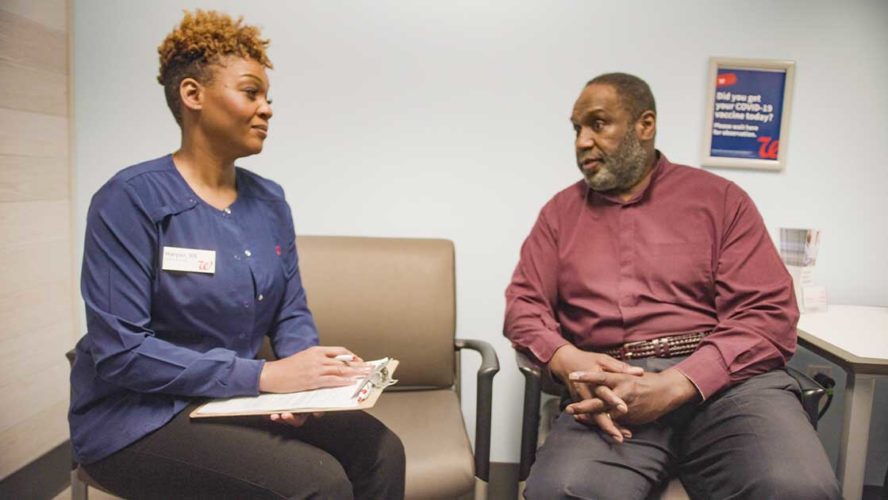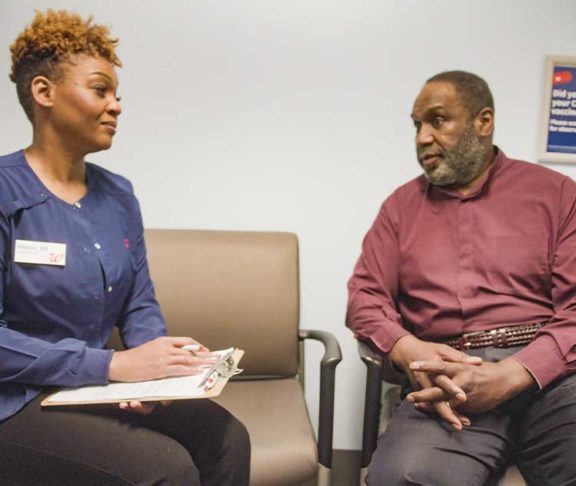People across the country struggle to learn about and participate in clinical trials. Local pharmacies may be the solution.

Ramita Tandon
Chief Clinical Trials Officer, Walgreens
“We want patients to feel empowered to talk with their providers about clinical trials.”
Clinical trials represent hope for people who have exhausted the standard options of care for a variety of disorders. But traditional barriers to participation in trials have inhibited the potential benefits — for example, 75% of clinical trial participants are white according to the U.S. Food and Drug Administration (FDA), but nearly 20% of the new drugs recently introduced affect various ethnic groups differently.
One major problem is recruitment as most trials don’t meet their enrollment goals. “Less than 5% of the U.S. population currently participates in clinical trials,” noted Ramita Tandon, chief clinical trials officer at Walgreens. “Historically, the clinical trial ecosystem has struggled to bring trials into communities.”
Going Local
Enrollment difficulties for clinical trials translate to slower research, fewer treatments, and less effective medications.
“One issue is the lack of information and education,” Tandon said. “From a patient’s perspective, there are other barriers: travel, language, digital and health literacy, or some of the negative events that have occurred for certain patient populations. There’s a lot of misconceptions out there, a lot of fear.”
Some of these barriers can be eliminated by bringing clinical trials closer to communities. Walgreens, for example, has launched a clinical trials business leveraging its established pharmacy presence and nationwide footprint to redefine the patient experience in research.
“We have access to nearly 9,000 pharmacies and millions of patients— we are in the fabric of every community,” noted Tandon. “When a patient comes in and is flagged as eligible for a clinical trial in our systems, there’s a natural dialogue that takes place with our pharmacy teams.”
Additionally, by providing broader access to the latest research and medicine, and ensuring the data underlying the marketing and approvals of medicines are representative of the populations they’re meant to treat, Walgreens aims to help improve health outcomes.
Easy, Safe, and Accessible
Today, Walgreens is leveraging its rich data and compliance framework to identify the right populations to engage with to increase access and diversity in the trials it supports.
“We have the ability to mine for patients who might be eligible for a number of trials,” Tandon said. “First we look at the requirements provided by the pharmaceutical company, then use the technology we’ve put in place to identify patients and put together a holistic view of their treatment journey.
“Then we can do outreach, whether it’s through in-store interactions, digital channels or call centers, to see if patients are interested in participating. As always, patient choices remain the central focus of the Walgreens experience.”
If the patient wants to proceed, they can answer some pre-screening questions. Then, if accepted into the trial, they will be directed either to a designated provider or to a Walgreens location where the company has set up a clinical trial center. Throughout the process, the patient is supported by their local Walgreens team, and Tandon stresses that Walgreens follows all regulations and applicable laws in terms of data storage and patient privacy. ”We provide full transparency up front when we educate patients so they’re fully aware what information is collected.”
Bringing clinical trials directly into local communities not only helps people discover experimental treatments when existing therapies are ineffective, but also benefits the healthcare system as a whole: It increases the number of study participants to diversify clinical trial populations, which then speeds up testing and developing effective therapies.
The main goal is making people healthier. “We want clinical trials to be viewed as a care option,” Tandon said. “Ultimately, we want patients to feel empowered to talk with their providers about clinical trials.”
Click here to learn more about Clinical Trials at Walgreens


